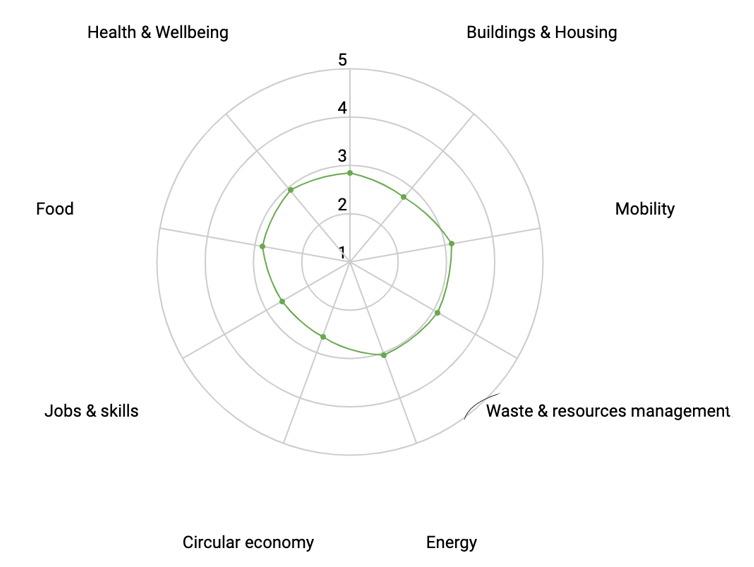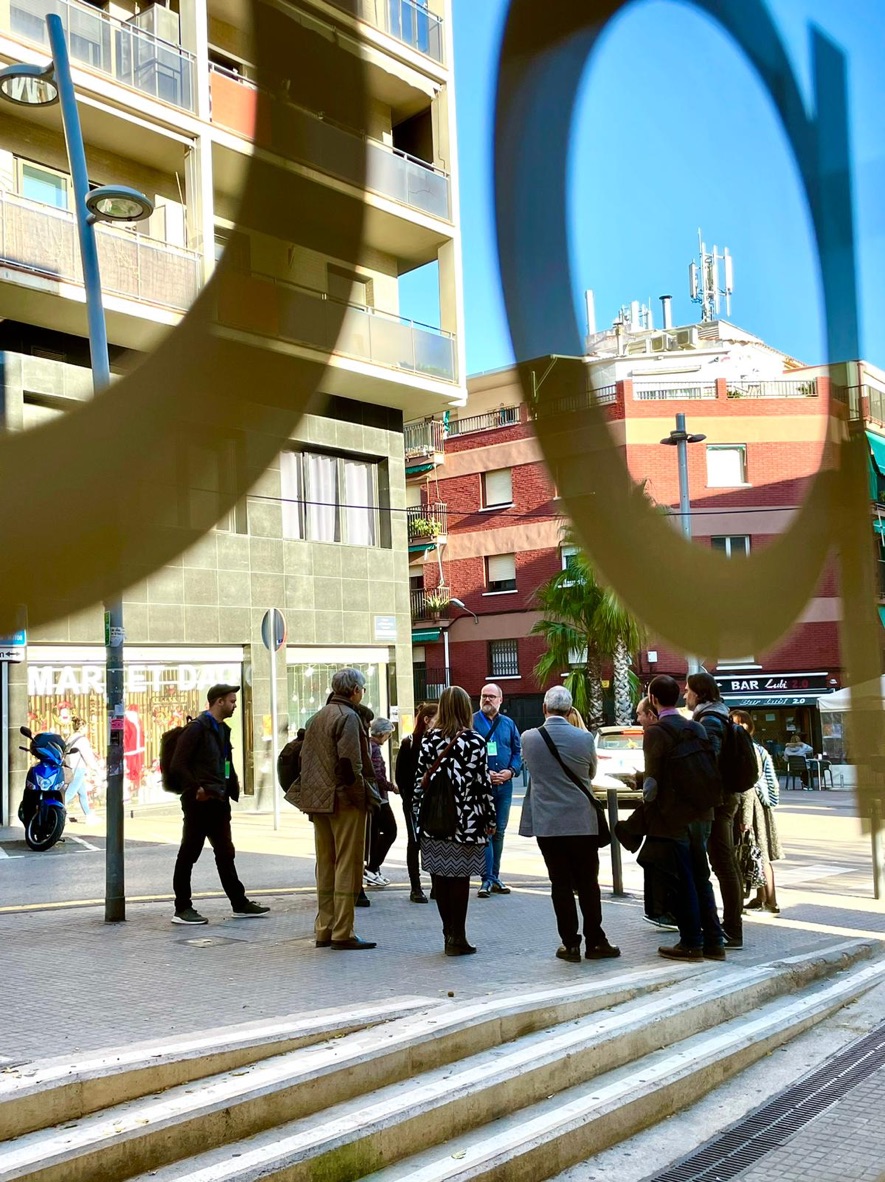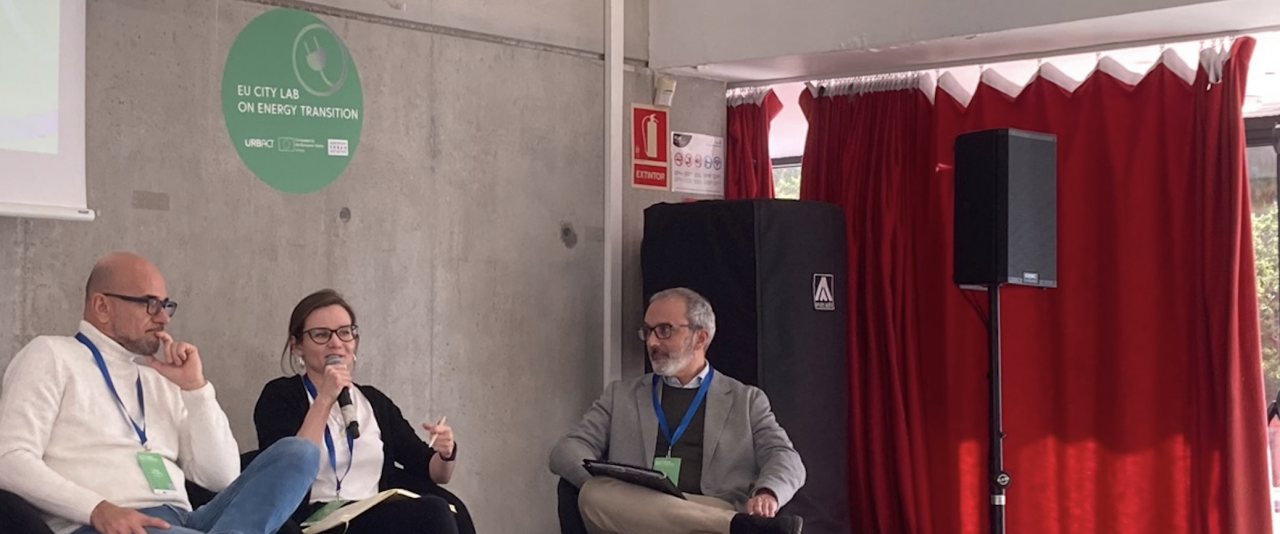How it all started?
Back in 2022, more than 70 cities across Europe – alongside relevant organisations working with environmental matters – took part in an URBACT study. The goal was to better asses capacity-building needs of cities when it came to the green transition, a term that requires some demystification as the findings suggest.
In a nutshell, a green and just transition consists of a shift towards new and affordable models that value the environment, while prioritising people’s well-being, resource-efficient and sustainable economies. Among urgent, priorities respondents highlighted their needs for creating further awareness and increase their knowledge, as well as finding resourcing and financing the green transition.
Energy, mobility and waste ranked as the most relevant topics for cities, followed by food, health, circular economy, housing and jobs & skills. With EUI, URBACT has decided to build on the energy experiences from the VILAWATT Innovation Transfer pilot, which was originally an Urban Innovative Actions-funded project (former EUI - Innovative Actions) in Viladecans (ES); and the food achievements from the BioCanteens and BioCanteens#2, Transfer Networks that were led by Mouans-Sartoux (FR), a city that is now a partner in EUI’s Urban Agenda for the EU Food Partnership.
What was the first EU City Lab like?
 Between 23 and 24 November 2023, 61 people – from city representatives to Managing Authorities – took part in the first EU City Lab in Viladecans (ES). The intense two-day event enabled participants to discover local practices in the field of energy transition, the challenges to set up energy communities, and how a multi-level governance approach can help shape more energy-efficient cities. It was also an opportunity to learn more about the experience of the host city, while making connections to a green just transition.
Between 23 and 24 November 2023, 61 people – from city representatives to Managing Authorities – took part in the first EU City Lab in Viladecans (ES). The intense two-day event enabled participants to discover local practices in the field of energy transition, the challenges to set up energy communities, and how a multi-level governance approach can help shape more energy-efficient cities. It was also an opportunity to learn more about the experience of the host city, while making connections to a green just transition.
Under the VILAWATT Urban Initiative Actions’ project, Viladecans developes a citywide energy strategy, as well as to explore alternatives for citizen engagement and retrofitting buildings. With the URBACT network, the city could further refine actions, while learning and exchanging with three project partners. The work of this network also reflected on the possible ways to implement the European Commission's Clean Energy for All Europeans Package (2020), which recognises the rights of citizens and communities to engage directly in the energy sector, while contributing to the Cohesion Policy – particularly the Policy Objective 2 for a “greener Europe”.
In total, 11 countries were represented at the EU City Lab. Spain had the largest representation with a total 32 attendees, followed by Greece and North Macedonia, with four attendees each. The remaining eight countries were represented by one attendee each. Although beneficiaries from current URBACT networks and previous EUI projects were present, 40% of the attendees were newcomers to the programme and the initiative. This proves to be a successful experience as to how we can connect and strengthen a larger knowledge community. It’s worth mentioning that the majority of attending participants worked in energy-related areas and had a medium to high level of knowledge of and experience with energy transition, as shown by their responses to the following two questions in the online registration form:
Participants’ previous knowledge and background in the field of energy transition
The feedback received from participants on-site indicate that this event was appreciated by its attendees, who valued both the learning component and the networking opportunities that it offered. The city visits, in their format of “walking and learning” tours, were one of the most appreciated components of the EU City Lab. According to a follow up survey on the visits, participants particularly enjoyed the occasion to exchange with people working on the ground and other locals, but also to get a glimpse of hands-on examples. Viladecans has managed to adapt the “EU energy community” concept to its own needs, creating its own “sharing communities”.
Participants were asked if they would be interested in the continuation of URBACT-EUI labs in energy transition and, if so, which topics and challenges should the next event focus in. Responses were positive among the people sitting in the room. The most recurrent ideas were summarised in a word cloud:
URBACT and EUI consider a good result the diversity achieved in the audience, both in terms of geographical scope and professional background. The presence of many energy transition experts, with sound knowledge and experience in the field, proves the quality and interest of the programme proposed. The lessons learnt from this pilot experience will be used to increase the attendance rate and refine the EU City Lab format in view of future iterations.
When will the next lab take place?
Save the date! The next EU City Lab, co-organised by URBACT and EUI, will be on the topic of food governance and will take place in Mouans-Sartoux (FR), early March 2024. This edition of the event will focus in the cities’ role to change food production and behaviour patterns for a greener future. Other EU City Labs on food, as well as a lab on funding the energy transition is also planned throughout the year.
Stay tuned and be the first one to know about upcoming events by subscribe to URBACT’s newsletter and EUI's newsletter. In the meantime, you can check below some of the material from the first EU City Lab and browse through Portico to get more knowledge on energy transition!


